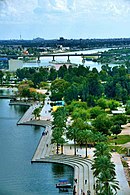Events in the year 2004 in Iraq.

An Iraqi insurgency began shortly after the 2003 American invasion deposed longtime leader Saddam Hussein. It is considered to have lasted until the end of the Iraq War and U.S. withdrawal in 2011. It was followed by a renewed insurgency.

After the 2003 invasion of Iraq was completed and the regime of Saddam Hussein was toppled in May 2003, an Iraqi insurgency began that would last until the United States left in 2011. The 2003–2006 phase of the Iraqi insurgency lasted until early 2006, when it escalated from an insurgency to a Sunni-Shia civil war, which became the most violent phase of the Iraq War.
Jeish Muhammad is an Iraqi militant group that is both politically and religiously motivated. The politically motivated faction within JM is primarily made up of former Ba'athist members mainly from the Sunni region. Many who enjoyed special status during the leadership of Saddam Hussein were from Tikrit, which is in turn within an area of Iraq where the Arab population is mostly Sunni. People who generally hold the ex-vice-president, Izzat Ibrahim ad-Douri, in exceptionally high esteem were members of the security, intelligence and police forces from the previous government.
The Hayy Al-Jihad massacre occurred on July 9, 2006 in the Hayy Al-Jihad neighborhood of the Iraqi capital, Baghdad. An estimated 270 Sunni civilians were killed in revenge attacks by Shia militiamen from the Mahdi Army for the previous unprovoked anti-Shiite killings.

Al-Adhamiyah, also Azamiya, is a neighborhood and east-central district of the city of Baghdad, Iraq. It is one of nine administrative districts in Baghdad.

The 2004 Iraq spring fighting was a series of operational offensives and various major engagements during the Iraq War. It was a turning point in the war; the Spring Fighting marked the entrance into the conflict of militias and religiously based militant Iraqi groups, such as the Shi'a Mahdi Army.

Operation Imposing Law, also known as Operation Law and Order, Operation Fardh al-Qanoon or Baghdad Security Plan (BSP), was a joint Coalition-Iraqi security plan conducted throughout Baghdad. Under the Surge plan developed in late 2006, Baghdad was to be divided into nine zones, with Iraqi and American soldiers working side by side to clear each sector of Shiite militias and Sunni insurgents and establish Joint Security Stations so that reconstruction programs could begin in safety. The U.S. military commander in Iraq, David Petraeus, went so far as to say Iraq would be "doomed" if this plan failed. Numerous members of Congress stated the plan was a critical period for the U.S. presence in Iraq.

The Diyala province campaign was a series of operations conducted by coalition forces against Iraqi insurgents and a number of bombing and guerrilla attacks against the security forces in Diyala Governorate of Iraq, with the purpose of control of the province.
Al Rasheed or Al Rashid is one of the nine administrative districts in Baghdad, Iraq. It is in southern Baghdad, on the western side of the Tigris River. Mansour district is to the north of the western half of the district, on the other side of the Baghdad Airport Road.

Tanzim Qaidat al-Jihad fi Bilad al-Rafidayn, more commonly known as Al-Qaeda in Iraq, was a Salafi jihadist organization affiliated with Al-Qaeda. It was founded on 17 October 2004, and was led by Abu Musab al-Zarqawi and Abu Ayyub al-Masri until its disbandment on 15 October 2006.

The siege of Sadr City was a blockade of the Shi'a district of northeastern Baghdad carried out by US and Iraqi government forces in an attempt to destroy the main power base of the insurgent Mahdi Army in Baghdad. The siege began on 4 April 2004 – later dubbed "Black Sunday" – with an uprising against the Coalition Provisional Authority following the government banning of a newspaper published by Muqtada Al-Sadr's Sadrist Movement. The most intense periods of fighting in Sadr City occurred during the first uprising in April 2004, the second in August the same year, during the sectarian conflict that gripped Baghdad in late 2006, during the Iraq War troop surge of 2007, and during the spring fighting of 2008.
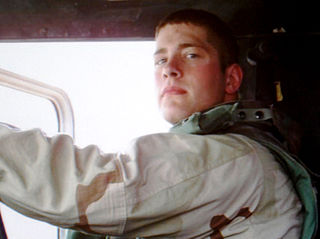
The 2004 Good Friday ambush was an attack by Iraqi insurgents on April 9, 2004 during the Iraq War on a convoy of U.S. supply trucks during the Battle of Baghdad International Airport. It happened in the midst of the Iraq spring fighting of 2004, which saw intensified clashes throughout the country.

The Islamic State of Iraq was a Salafi jihadist militant organization that fought the forces of the U.S.-led coalition during the Iraqi insurgency. The organization aimed to overthrow the Iraqi federal government and establish an Islamic state governed by Sharia law in Iraq.
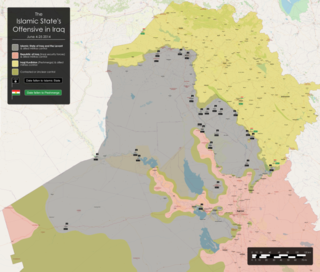
The Northern Iraq offensive began on 4 June 2014, when the Islamic State of Iraq and Levant, assisted by various insurgent groups in the region, began a major offensive from its territory in Syria into Iraq against Iraqi and Kurdish forces, following earlier clashes that had begun in December 2013 involving guerillas.
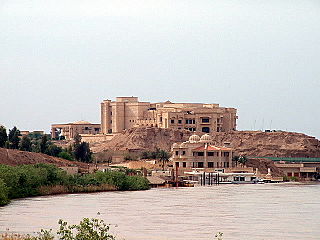
The First Battle of Tikrit was fought for the Iraqi city of Tikrit following the city's capture by the Islamic State and Ba'athist Loyalists during the 2014 Northern Iraq offensive. The battle took place between 26 and 30 June 2014.

The departure of US troops from Iraq in 2011 ended the period of occupation that had begun with the U.S.-led invasion in March 2003. The time since U.S. withdrawal has been marked by a renewed Iraqi insurgency and by a spillover of the Syrian civil war into Iraq. By 2013, the insurgency escalated into a renewed war, the central government of Iraq being opposed by ISIL and various factions, primarily radical Sunni forces during the early phase of the conflict. The war ended in 2017 with an Iraqi government and allied victory, however ISIL continues a low-intensity insurgency in remote parts of the country.
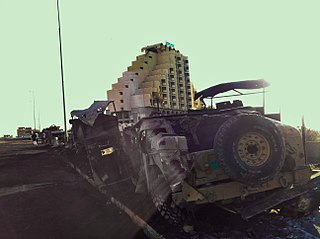
The fall of Mosul occurred between 4 and 10 June 2014, when Islamic State (IS) insurgents, initially led by Abu Abdulrahman al-Bilawi, captured Mosul from the Iraqi Army, led by Lieutenant General Mahdi Al-Gharrawi.















